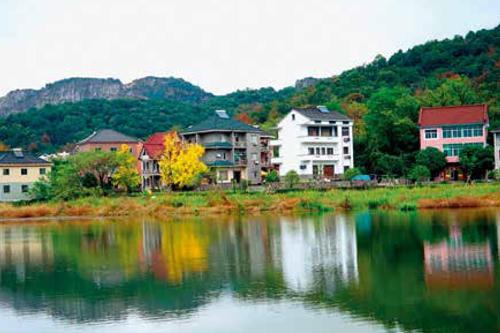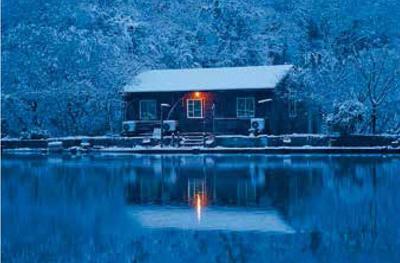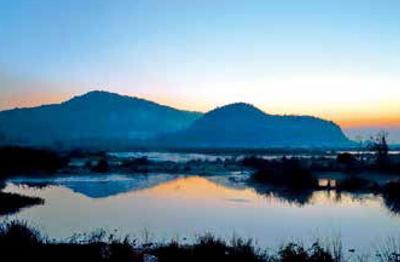湖埠里,朱熹苏东坡曾驻足
2020-04-20袁长渭
袁长渭



这里有美丽的湖埠十景,有旖旎的湖光山色,还盛产西湖莼菜和九曲红梅。而湖埠里流传的一些旧事,也为此处增添了一抹神秘色彩。
4月的钱塘泗乡,油菜花遍地开放。行走在开满油菜花的田埂上,田边的水面恰到好处地将油菜花、湖水与湖边的群山组成一幅绝美的图画。远处的云泉山和风水洞最为显眼,近处的昙山成了点缀,花山和公館山更是双峰插云,巍然耸立。
泗乡位于杭州市西湖区之江地区,是古时定山南乡、定山北乡、长寿乡和安吉乡的合称,范围大致与杭州转塘街道()双浦镇()相一致,附近有中国美术学院、浙江音乐学院、西湖高等研究院等高等院校。
在古老的农耕社会,钱塘江边的泗乡作为钱塘县的最重要组成部分,是浙江通往福建、江西等省的水陆交通要道,也是浙江省上八府和下三府的最主要连接点。
位于钱塘泗乡的铜鉴湖边,是杭州通往富阳的必经之地,秦始皇、白居易、苏东坡、范仲淹、朱熹、乾隆、董邦达等历史名人,在湖埠里都留下过足迹或诗刻。这里有美丽的湖埠十景,有旖旎的湖光山色,有风水洞和灵山幻境景区,还名产西湖莼菜和九曲红梅。
除了优美的风景,在湖埠里流传的一些旧闻也为此处增添了一抹神秘色彩。
进士冯来聘
明朝末年,钱塘泗乡有四大才子——
转塘午山村的葛寅亮是乡试解元,后来中了进士,人称“葛湖南”(),他家和大诸桥、千金闸()的建造有关系。
转塘双流村的陈之煌中了进士做了官后,筹集资金修建了双流村的前溪和后溪,解决了村里发大水的难题,也就是现在凤凰创意园里的溪流和中国美院里象山南渠。浮山郑尚友也中了进士,出任明朝福建长乐县最后一任知县,也做了清朝第一任长乐县知县,并且两次被康熙皇帝定为“天下第一清官”,与大名鼎鼎的于成龙同时入清官名录,这就是浮山头“郑做官”的来历。
湖埠里的冯来聘也在同时期中了进士,乡试时和葛寅亮同一榜。50多年前,冯来聘进士府第的台门还在,现在已经不见了踪影。
冯来聘没有中举前,曾经砍过柴,翻过陆家岭到凌家桥街上去卖柴。他在陆家岭凉亭休息时发誓说,将来若有出头之日,定要削平陆家岭,让卖柴人如履平地。等到冯来聘中了进士做了山东省的御史后,再回到铜鉴湖畔湖埠里,小时候的玩伴戏谑地问他:“来聘,你说做了大官就削平陆家岭,什么时候来削平啊?”冯来聘笑着回答说:“我坐着八抬大轿过陆家岭就是平的呀!”原来,对坐在轿子上的大官冯来聘来说,陆家岭已经是平地了。
这条山路笔者也曾走过多次,直到20多年前这条山路才被废弃。
冯来聘没有削山,但出资在湖埠溪上建了一座桥,叫做“无私桥”,希望自己的子孙后代能有公德心,无私奉献乡里,造福桑梓。现在,无私桥依然屹立在冯家湖埠溪上,古老的桥板被沥青盖住了,“无私桥”三个字还在,是我同学冯剑威的父亲冯柿豪叔叔题写的。
冯来聘还曾经发过一个誓:升一级,造一个凉亭。而且他确实做到了。从湖埠里冯家到杨村有三个凉亭,都是冯来聘出资建造的。50多年前,三个凉亭都还在,现在只剩下一个了,希望能长久。
朱熹和昙山
湖埠村的南面有一座山,叫昙山。昙山在南宋时非常有名,引得理学祖师爷朱熹来了3次,盘桓多日,并且留下了在杭州的唯一石刻。南宋绍熙五年,朱熹游湖埠昙山,留题一诗于棋坪石南侧。诗云“颓然见兹山,一一见天作。信手铭岩墙,所愿君勿凿。”同年十月,朱喜重游昙山,摩崖正书于仙人洞侧,“绍熙甲寅闰十月癸未,朱仲晦()南归,重游郑君次山园亭。”
昙山上有一石洞,名字叫清虚洞,也叫金牛洞,因为传说从前的铜鉴湖叫金牛湖,金牛逃到了洞里,从此没有出来过,洞里有时还会发出“哞哞”的金牛叫声。
清虚洞还被叫作仙人洞,也有一个传说。一位仁桥村()的小伙子上昙山砍柴,到了清虚洞里看到两位老者在对弈,小伙子就把斧头立在地上,屁股坐在斧头柄上看他们下棋。没一会儿,他肚子饿了,两位下棋的老者拿了石桌上的桃子给小伙子吃。等到小伙子看完这局棋站起来时,斧头上的木柄已经腐烂了。原来,小伙子坐在泥地上很长时间了,自己却没有察觉到。他回到仁桥村,发现距离他生活的那个年代已经过去了几百年。他的家谱上还能查到他的名字,也记载了他打柴失踪的事情。所谓“仙界一日,人间千年”。原来,吃了仙桃,砍柴小伙也成了神仙。仙人洞里仙人下棋的那个石板棋盘至今还在,石板上依稀还能看到棋盘的模样。当然,这都是后人为了丰满这个传说而做的美好想象。
白居易、苏东坡和湖埠风水洞
湖埠里有一著名的风景点就是风水洞,由风洞和水洞组成,直到现在水洞里还能撑船。
风水洞洞外有一寺庙叫慈严寺,或者叫恩德寺,所以风水洞也叫慈严洞和恩德洞。白居易做杭州刺史时,与慈严寺主持慧日禅师交好,常来湖埠里看望慧日禅师,并且留下了许多诗作,比如“云水埋藏恩德洞,簪裾束缚使君身。暂来不宿归州去,应被山呼作俗人”。
到了北宋末年,苏东坡两次出仕杭州,也经常来湖埠里视察工作和游玩。苏东坡游风水洞时留下的著名诗句,至今还刻写在风水洞口——
往富阳新城李节推先行三日留风水洞见待
春山磔磔鸣春禽,此间不可无我吟。
路长漫漫傍江浦,此间不可无君语。
金鱼池边不见君,追君直过定山村。
路人皆言君未远,骑马少年清且婉。
风岩水穴旧闻名,只隔山溪夜不行。
溪桥晓溜浮梅萼,知君系马岩花落。
出城三日尚逶迟,妻孥怪骂归何时。
世上小儿夸疾走,如君相待今安有。
诗里的定山村就是转塘凌家桥村,“风岩水穴”指的就是风水洞,“山溪”就是湖埠溪,也就是铜鉴湖,隔湖就是风水洞。
苏东坡为了劝湖埠里人养鹅致富,还写下了《风水洞二禽》:“林外一声青竹笋,坐间半醉白头翁。春山最好不归去,惭愧春禽解劝侬。”
筆者也经常去铜鉴湖畔湖埠里游玩,有感而发,写了一首打油诗:“姚坞书声朗,父子俩宰相。陆家岭依旧,无私渊源长。风洞凉风爽,水洞流水畅。登山观沧海,紫薇现东方。莼思归故里,昙山书声扬。山翠石亦奇,铜鉴碧波漾。恩德钟声响,山下屯盐场。来客知苏白,崖刻壁上苍。”
Anecdotes of Hubuli
By Yuan Changwei
Sixiang was an integral part of the Qiantang prefecture (present-day Zhijiang district of Hangzhou) in the agrarian age, and is a transportation hub connecting Hangzhou with Fujian and Jiangxi provinces. Seated near the Tongjian Lake in Sixiang, Hubuli is the conduit linking downtown Hangzhou with Fuyang, and is a breathing time-capsule of history and culture. Intriguing legends and tales about emperors and many cultural notables, together with the “Top 10 Attractions of Hubuli” and seasonal treats from the West Lake and the tea fields, all contribute to the captivating charm and mystery of Hubuli.
In the late years of Ming dynasty (1368-1644), Sixiang rose to fame for producing four “Jinshi” (successful candidates in the imperial examinations of feudal China): Ge Yinliang, Chen Zhihuang, Zheng Shangyou, and Feng Laipin. The legacy of Chen Zhihuang, from Shuangliu Village, can be seen by people today at the Xiangshan Campus of China Academy of Fine Arts.
Before he made his name, Feng Laipin was a woodcutter making a living by selling firewood. One day when he was taking a rest on his way to the marketplace in Lingjiaqiao, he vowed to turn the rugged mountain footpath he had to take so painstakingly every day into a flat one. Years later, Fengs childhood friend jokingly challenged him: “Now that you have gone up in the world, did you forget what you promised?” “Now I am on a sedan chair; and for me it is not a rugged journey anymore,” said Feng.
A bridge called “Unselfish Bridge” on the Hubu River was built by Feng Laipin to remind later generations of the importance of having a caring heart for the other people. He also kept his promise of building a pavilion each time he got a promotion. One of the three pavilions he ordered to be built can still be seen in Hubuli.
Tanshan Hill, south of Hubu Village, drew Zhu Xi (1130-1200), a great Song-dynasty synthesist of philosophy of principle, three times. The result of one of the scholars visits is the only stone inscription the master philosopher left in Hangzhou.
A stone cavern called Qingxu also adds to the mystery of the hill. Legend has it that the mooing sound the locals claim to have heard in the cave is because a bull was once here. The cave is also called “Cave of Immortals”. The locals believe in a story about a young man who went into the depths of the hill to chop firewood and chanced upon two old man playing chess in the cave. He put the axe away and watched the game with great interest until the game was over, without realizing how long he had been sitting there. He went back home, and found hundreds of years had elapsed. The only thing he remembered was a peach he ate when watching the game. The story about immortals may sound cliché, but the stone checkerboard is still recognizable in the cave.
One of the top attractions of Hubuli is the Wind and Water Cave. As the name suggests, there is water running through it. Outside the cave there is a temple called Ciyan, although the locals also call it Ende Temple. During his term of serving as Hangzhou governor, Bai Juyi (772-846), Chinese poet of the Tang dynasty was a regular visitor at the temple and made friends with the abbot, Master Huiri. The twos interaction and friendship was written into a host of poems by Bai Juyi.
Hubuli was also a favored business and leisure destination of Su Dongpo (1037-1101), the great Northern Song poet and scholar, during his two tenures in Hangzhou. One of the mans poems can be seen at the entrance of the Wind and Water Cave, suggesting that he spent some happy, relaxed time there.
The Dingshan Village he mentioned in the poem is the present-day Lingjiaqiao Village in Zhuantang, Hangzhou. Su Dongpo also taught the Hubuli people how to make a better life by raising geese. Instead of writing a detailed document, of course, he wrote a poem to communicate with the villagers.
